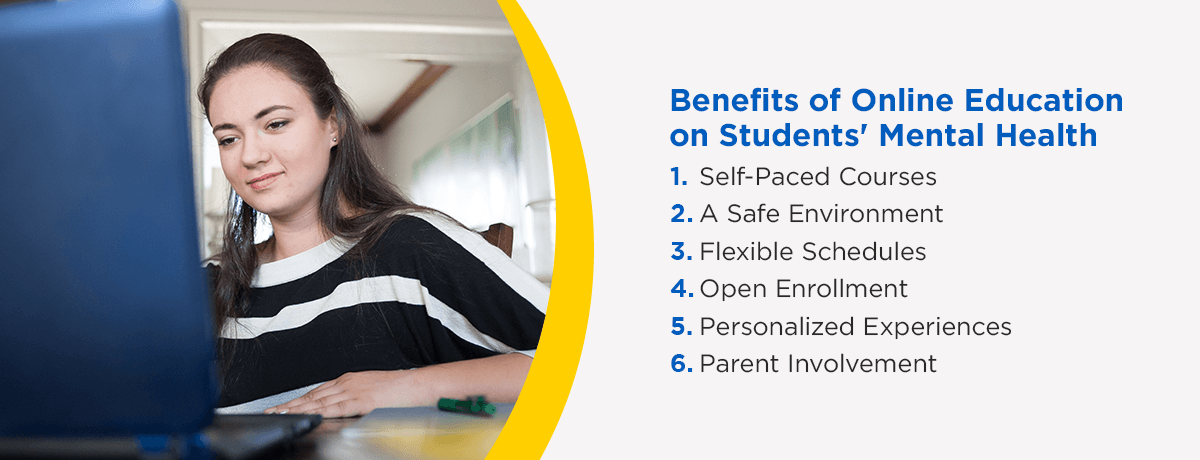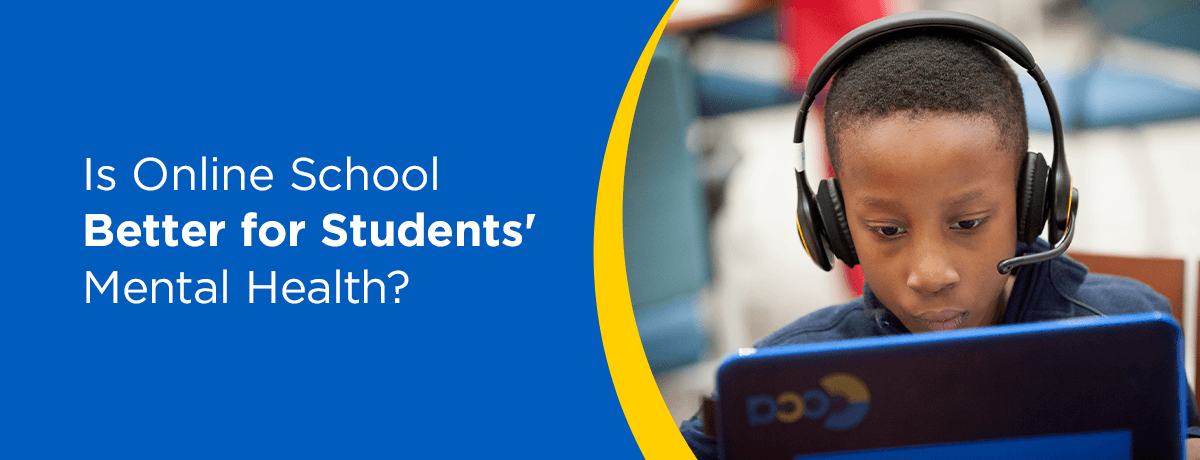When we think about student health, the first things that come to mind might involve fitness, immunity, or other aspects of physical well-being — but what about their mental state? Fortunately, the stigma around mental health is disappearing. Nowadays, parents and educators are working hard to support the mental health of students of all ages.
One solution many families turn to is online school. Some discovered the benefits during the COVID-19 pandemic and wanted to maintain that positive influence. Others have enrolled in cyber school to address common problems like bullying or unrealistic standards of learning.
Learn more about the benefits of online school for students’ mental health.
Understanding Mental Health and Mental Illness
Before we compare in-person and online school, we need to clarify the difference between mental health and mental illness. Many people use these terms interchangeably, but they mean subtly different things:
- Mental health: Mental health applies to everyone. It involves our emotional, social, and psychological well-being at different times. It influences how we think, feel, and act and can impact our relationships, physical health, and our responses to stress, among other types of behavior. Your mental health can change over time, often in response to stressors. Poor mental health can come from a wide range of factors, like experiencing physical illness, the death of a relative, economic hardship, or excessive work hours.
- Mental illness: When a person has a mental illness, they have been diagnosed with a disorder, such as depression or anxiety. While these conditions are common and affect a person’s mental health, they come with specific criteria and often come from biological factors, chemical imbalances, or traumatic experiences.
These two concepts overlap but require different approaches. For example, a mental illness might be treated with medication. That same approach may not be appropriate for someone experiencing poor mental health due to stress from a high workload.
Some examples of mental illnesses include:
- Major depressive disorder (MDD)
- Anxiety disorders, including generalized anxiety disorder (GAD), social anxiety disorder (SAD), panic disorder, and obsessive-compulsive disorder (OCD)
- Attention-deficit hyperactivity disorder (ADHD) and autism spectrum disorder (ASD)
- Bipolar disorder
- Schizophrenia
- Post-traumatic stress disorder (PTSD)
- Eating disorders
- Behavioral disorders, such as conduct disorder
Importance of Promoting Students’ Mental Wellbeing
About 20% of kids have a mental, behavioral, or emotional disorder like the ones listed above. These disorders, along with poor mental health, can have serious impacts. Mental health problems can affect things like:
- Energy and concentration
- Substance use
- Suicide risk
- Academic performance
- Productivity
- Mood
- Physical health
- Emotional health
- Relationships
- Overall quality of life
Most of these connections are well-documented. For example, students aged 6-17 who have emotional, behavioral, or mental concerns are three times more likely to repeat a grade than their peers. Within the juvenile justice system, a whopping 70% of kids have diagnosable mental health conditions. The drawbacks persist into adulthood, affecting factors like financial stability and job performance.
To help students avoid these problems and thrive in their educational careers, we must create environments that foster good mental health and encourage healthy habits. Much of this task involves addressing a wide range of negative influences, such as a student’s family life, bullying and cyberbullying, unrealistic expectations at school, and threats to safety and health.

Benefits of Online Education on Students’ Mental Health
Schools can be a source of stress in many different ways. For example, a student might feel unsafe at school due to bullies or an outbreak of illness, or they could be stressed due to overgeneralized classes that don’t meet their needs. Online school can help mitigate these issues with advantages like:
1. Self-Paced Courses
By having the option to complete coursework at their own pace, students can accommodate their preferences and schedules. A child who needs more time to go over information can do so and learn the content in the way that works best for them. They don’t need to feel embarrassed, and they can avoid the pressure of deadlines. Alternatively, students can work ahead and stay engaged.
2. A Safe Environment
For many students, the in-school setting doesn’t feel safe. It may introduce bullies, health issues, anxiety, harassment, or unhealthy levels of competition. Working from home can eliminate or drastically reduce the effects of these stressors. Kids can feel much safer and more comfortable as they do their work. It’s especially good for shy students, who have more ways to interact with others without being in the spotlight.
Cyber school can also help reduce distractions for those who have trouble focusing. It can help students with ADHD or other attention problems zero in on their schoolwork. It can also help students with anxiety disorders avoid their triggers. For instance, a student with OCD might find a home learning environment more effective because they can work in a place where they feel in control and aren’t distracted by as many compulsive thoughts.
3. Flexible Schedules
With asynchronous learning, families can create a schedule that works for them. A student who babysits in the evenings or has problems sleeping can do their work during the daytime instead. Plus, the school day inside a brick-and-mortar school involves a lot of non-educational time. Online school cuts down on this with a more focused approach. Students can have more time to spend with friends and family or on hobbies, which are key parts of good mental health.
Some kids also need to spend significant time seeing doctors or focusing on their mental health, and cyber school can make the process easier. The flexibility of cyber school can help students reduce common stressors and tackle mental health issues when they’re ready.
4. Open Enrollment
Many online schools, like Commonwealth Charter Academy, have open enrollment all year long. If you find your student could benefit from online school halfway through the year, they can still enroll. This option often helps students who are going through stressful situations or have been newly diagnosed with a mental illness. Our educators and faculty are here to support them through the transition.
5. Personalized Experiences
Online students get to take classes that fit their interests and skill levels. There is no one-size-fits-all approach, so families can cultivate an educational environment that’s engaging and accommodating to the student’s mental health.
6. Parent Involvement
When kids learn from home, parents get a front-row seat to their student’s learning habits. They can learn more about the child’s learning routines and any struggles they’re facing. Some parents struggle to understand their child’s problems if they seem fine at home. Working from home allows parents to see how their student learns and may help increase awareness for further resources, such as individual education programs (IEPs) or 504 plans.
Is Online School Better for Mental Health?
Every student is different, but online school tends to offer a more comfortable environment for students who need mental health support. It’s also more customizable, so educators and parents can create a setting that accommodates specific mental illnesses.
How CCA Supports Students’ Mental Health
The school itself has a crucial role in creating a mentally healthy educational environment. Here at CCA, we support our student’s mental health in many different ways, such as:
- School counseling and support services: CCA students have a rigorous support system and plenty of options. We have skilled school counselors and a robust Family Services Department. Our educators, family mentors, and even parents get training on identifying red flags associated with bullying and other issues.
- Customized, self-paced learning: Many CCA classes are asynchronous, allowing students to work at their own pace and attend classes that work best for their interests and needs. We help families design customized instruction plans and schedules to meet the unique needs of each child.
- Activities and clubs: Social and emotional learning are necessary components of good mental health, and CCA offers plenty of opportunities. We hold clubs, hundreds of field trips, workshops, and much more to help students engage with their peers in healthy ways.
Learn More About CCA
CCA offers support for students with mental illnesses and everyday mental health challenges. We can even help prevent them from appearing in the first place through an environment that supports good mental health. Contact us today to learn more about the process of online school and how we help Pennsylvania families foster healthy development.




